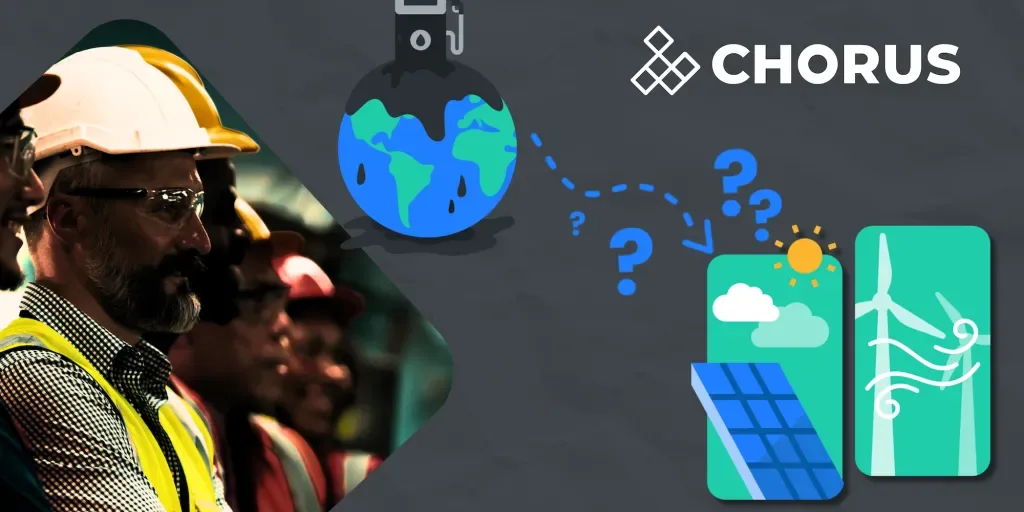4 March, 2024
The importance of upskilling for the energy transition: A Q&A with Chorus’ Co-Founder
As the world races towards a greener and more sustainable future in the face of heightened climate concerns, the importance of enabling a skilled and knowledgeable workforce cannot be underestimated. Energy companies across the world are diversifying from non-renewable to renewable energy sources, which brings about a growing need for change in skill sets and expertise across a range of job functions. In this Q&A blog post, Chorus Co-Founder and CRO, Iain Taylor, explores the critical role of upskilling in the energy transition and why it’s essential to engage with training providers as an integral part of the planning process…
Why is upskilling so important during the energy transition?
“As the energy landscape evolves, so do the demands of the sector’s workforce. The shift in energy resources necessitates a highly skilled workforce capable of navigating the complexities of renewable energy technologies.
“Sending oil and gas workers to wind farms instead of rigs simply isn’t enough; renewable energy technologies, such as offshore wind farms and solar power plants, introduce unique challenges that demand specialised training. For instance, working at sea requires offshore technicians to undergo safety training and understand the intricacies of working in a maritime environment. Similarly, solar installers need training to handle photovoltaic panels safely and optimise their energy output.
“Clearly, the energy transition represents a transformative journey towards a sustainable future and will require a variety of new skills, hazardous working environments and renewable energy operations, all of which demand specialised expertise and technical know-how.”
What would you say is the biggest challenge facing energy companies and how can they overcome it?
“One of the most significant challenges of the energy transition is the growing skills gap. The World Energy Employment 2023 report identified that global energy employment has surged to 67 million people in 2022 - a growth in 3.5 million people compared to pre-pandemic levels.
“However, the report also highlighted that although green recruitment is booming, there’s a significant lack of skilled labour which continues to sweep the industry. A high volume of job vacancies and the number of workers pursuing degrees and certifications are cited as two telling indicators of skills shortages. With the rapid expansion of renewable energy projects, it’s no surprise that the demand for skilled workers often surpasses supply.
“Established professionals and new entrants alike must undergo a process of upskilling and reskilling to adapt to the changing needs of the sector. Investing in skills development and training programs which are tailored specifically to the energy transition will enable companies to develop a pipeline of competent professionals, ready to embrace the challenges and opportunities presented by the energy transition. This means engaging with training providers who comprehend these nuances is essential to mitigate risks and maximise efficiency is key to unlocking the full potential of the workforce.”
How has the skills shortage impacted the sector at a local level?
“In an article published in February 2024, economic think tank Future Economy Scotland (FES) said that our home country is at risk of failing to create enough clean energy jobs to offset the loss of work in the declining North Sea.
“Scotland missed a target for offshore wind farm jobs by a whopping 90 per cent - with Holyrood ministers warning radical action is needed to secure the green jobs revolution. In new research, FES used the example of offshore wind, where the Scottish Government had projected that 28,000 workers would be employed by 2020. However, figures from the Office for National Statistics show that there were only 3,100 full time jobs in offshore wind in 2021 – just 11 per cent of the total forecast.
“Of course, it's not all doom and gloom; the green jobs market has grown not just globally but also in Scotland. Research at the start of 2024 by the Fraser of Allander Institute showed a 50 per cent surge in renewables jobs in 2021, up from 27,000 to 42,000 in just one year. And although offshore wind only employs 3,100 workers directly, it supports a total of 15,000 jobs through its supply chains.
“That being said, the shortfall in low-carbon employment clearly shows that significantly more training and upskilling is required to ensure North Sea oil and gas workforce are equipped to transition their skills and expertise in line with the sector’s evolution.”
How can energy companies look to cross skill their teams going forward?
“To effectively plan for the energy transition and keep up with the industry changes, collaboration with training providers is paramount. Specialised training providers play a vital role in designing and implementing programs that cater to the specific needs of the renewable energy industry. By collaborating with them, companies and organisations can ensure that their workforce acquires the right skills and knowledge to excel in their roles.
“Engaging with training providers also allows companies to receive customised training solutions that align with their organisational goals. Whether they’re striving to enhance the competencies of current employees, or preparing the next generation of renewable energy professionals, training programs can be tailored to individual requirements.
“Going forward, energy companies need to be thinking strategically about the energy transition, and proactively engaging with training providers to bridge the gap between conventional and renewable energy practices, as this is what will ultimately accelerate the global transition to benefit everyone.”
Ready to empower your team? Discover our bespoke e-learning solutions for optimised training and development.
